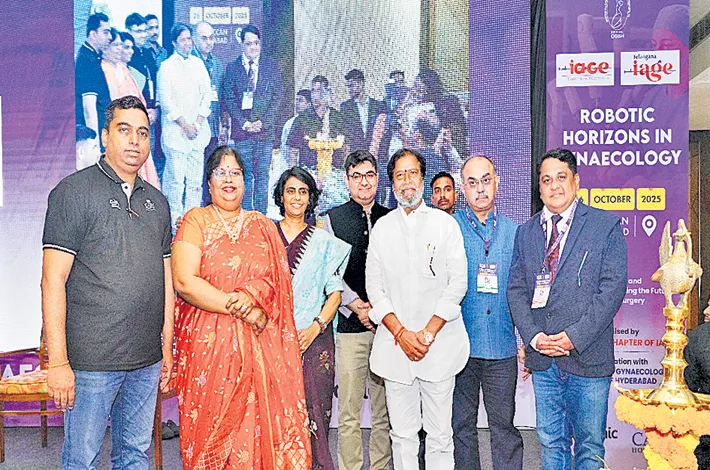A Spark in the City
04-07-2025 12:00:00 AM

Subrata laughed, thinking it a jest, but Arati’s eyes held a quiet resolve. She saw a chance to rewrite their story, to weave love and sacrifice into something bolder
In the bustling heart of 1960s Calcutta, where trams clattered and hawkers shouted, Arati Mazumdar lived a quiet life in a modest home with her husband, Subrata, their young son, Pintu, and Subrata’s elderly parents. Subrata worked as a bank clerk, his salary barely stretching to cover the household’s needs. Arati, with her gentle smile and deft hands, kept the family together, her days filled with chores and small joys—like braiding Pintu’s hair or sharing a stolen glance with Subrata over their evening tea. But the weight of financial strain hung heavy, and Subrata’s pride as the breadwinner began to fray.
One humid afternoon, as monsoon clouds loomed, Subrata returned home, his face etched with worry. Over dinner, he mentioned a neighbor’s wife who had taken a job to ease their burdens. His words were casual, but they struck Arati like a spark. “Why not me?” she asked, her voice soft but firm. Subrata laughed, thinking it a jest, but Arati’s eyes held a quiet resolve. She saw a chance to rewrite their story, to weave love and sacrifice into something bolder.
The next morning, Arati donned her best saree, a simple cotton one with a red border, and stepped into the city’s chaos. Her heart raced as she entered the office of a sales company, her fingers clutching a newspaper ad for a door-to-door saleswoman. The manager, a gruff man with a clipped mustache, hired her on the spot, impressed by her poise despite her inexperience. Arati felt a thrill—a mix of fear and freedom—as she left with a bag of samples and a list of addresses.
Her first days were clumsy. She knocked on doors in affluent neighborhoods, her voice trembling as she pitched household goods to skeptical housewives. But Arati had a gift: her sincerity disarmed even the sternest customers. She listened to their stories, shared small laughs, and soon her sales grew. Each evening, she returned home with a few rupees and a glow Subrata couldn’t ignore. He was proud but uneasy, his traditional heart wrestling with her newfound independence.
At work, Arati met Edith, an Anglo-Indian colleague with a quick wit and a kind heart. Edith taught her the city’s rhythms—how to navigate crowded buses, dodge leering men, and charm clients with a smile. Their friendship bloomed over shared lunches of muri and chai, Edith’s bold laughter easing Arati’s nerves. One day, Edith confided about her own love—a musician who dreamed of London but stayed for her. “Love bends, Arati,” she said. “It grows when you let it breathe.” Arati thought of Subrata, wondering if their love could stretch to hold her new self.
Subrata, meanwhile, felt the shift. Arati’s earnings eased their debts, but her late evenings and confident stride stirred something in him—jealousy, perhaps, or fear of losing the Arati he knew. One night, as she recounted a funny client story, he snapped, “You’ve changed. This job… it’s not you.” Arati’s heart sank, but she held his gaze. “It is me, Subrata. I’m still yours, but I’m more now.” The words hung between them, heavy with truth.
The tension simmered until a crisis at work forced Arati to choose. Edith faced unfair treatment from their boss, who dismissed her for her “outsider” status. Arati, now a top saleswoman, saw the injustice clearly. Her heart pounded as she stood up to the manager, her voice steady as she defended Edith. “If she goes, I go,” she said, risking the job that had given her wings. The manager, stunned, relented, and Edith kept her position. As Arati left the office, she felt taller, as if the city itself had lifted her.
That evening, she walked home through Calcutta’s neon-lit streets, her mind swirling. She loved Subrata deeply—his quiet kindness, the way he hummed old Tagore songs—but she couldn’t shrink back to fit his fears. At home, Subrata waited, his face softer than before. He had heard from a neighbor about her stand at work. “You’re brave,” he said, his voice low. “I was wrong to doubt you.” Arati’s eyes welled up. She took his hand, feeling the familiar warmth, and whispered, “We’ll find our way together.”
In the days that followed, Subrata began to see Arati anew—not just as his wife, but as a woman carving her path. He started helping with chores, even joking about her sales pitches. One evening, they took Pintu to the Maidan, the city sprawling around them. As they shared an ice cream, Arati leaned against Subrata, the skyline glittering like their shared dreams. Love, she realized, wasn’t just in the quiet moments—it was in the courage to grow, side by side, in a city that never stopped moving.
Their story wasn’t grand, but it was theirs—a romance not of sweeping gestures but of small, brave steps. In the heart of Mahanagar, Arati and Subrata found that love could hold both roots and wings, binding them closer as they faced the vast, vibrant world together.








